Friedrich Nietzsche at the Age of 19
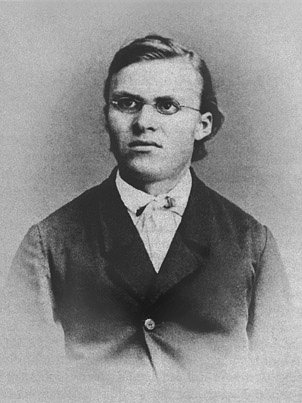
Credit: Gustave Schultze, 1864. Public domain
I stumbled on Will Durant's Book, The Story of Friedrich Nietzsche's Philosophy, when I was looking for something to listen to, something that might help me sleep.This book caught my attention and held it for about 15 minutes. And then I was gone.
In the morning, when I woke, I tried to find the last piece I'd heard and started listening again.Usually I'll wait till bedtime to start again, but Durant's writing is brilliant. He is irresistible. His books are among the very few I would read (or listen to) a second and third time.
Ariel and Will Durant, 1967
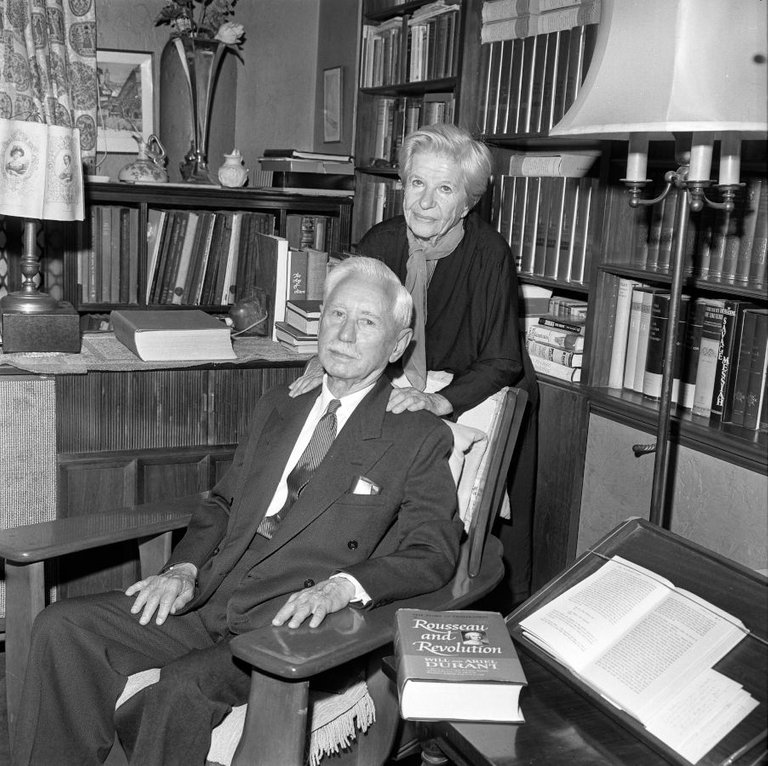
Credit: Bill Murphy, Los Angeles Times. Used under Creative Commons Attribution 4.0 International License. This wife and husband team may be one of the most famous collaborations in publishing/writing history.
Durant has the credentials to undertake the task of explaining Nietzsche's philosophy. Over his career, Durant has written sweeping tomes on the history of civilization, the history of philosophy, and the major concepts of significant individual philosophers. His approach toward Nietzsche is to rely heavily on the text rather than on secondary sources.
I think it is beyond question that Nietzsche was a tortured soul. I think he needed something to explain wretched life, as he saw it. It seems he found his truth when he wrote Thus Spake Zarathustra. While this work was not well received at the time of publication, it eventually became one of the most influential books of the 19th century.
Also Sprach Zarathustra (Thus Spake Zarathustra),
Book Cover

Credit: Book by Friedrich Nietzsche. Cover scan, unknown author. Public domain (because of age)
I've read that Nietzsche died too young, in that he did not have time to develop a mature philosophy, one that would have taken the sharp edges off his philosophy. His apologists often suggest that his more objectionable (to some of us) ideas--frank misogyny, idealization of war, espousal of autocratic regimes, to name a few--would have softened in time.
From Durant (who is sympathetic, though not an apologist):
He did not live long enough, or widely enough, to mature his half-truths into wisdom. Perhaps if he had lived longer he would have turned his strident chaos into a harmonious philosophy.Location
Nothing in the man's previous writing or statements supports this view. Indeed, as he grew older, Nietzsche seemed to harden, and become more extreme in his thinking.
Other modern philosophers did not have much longer to develop their thought system. Nietzsche died at 55 (1844-1900). Søren Kierkegaard was 42 at the time of his death (1813–1855). William James was 68 (1842-1910). Albert Camus, 46(1913-1960). No one makes excuses for these philosophers. Their words live and speak for them. So it is with Nietzsche.

Volume #661 of 1873 Titles in the Little Blue Book Series
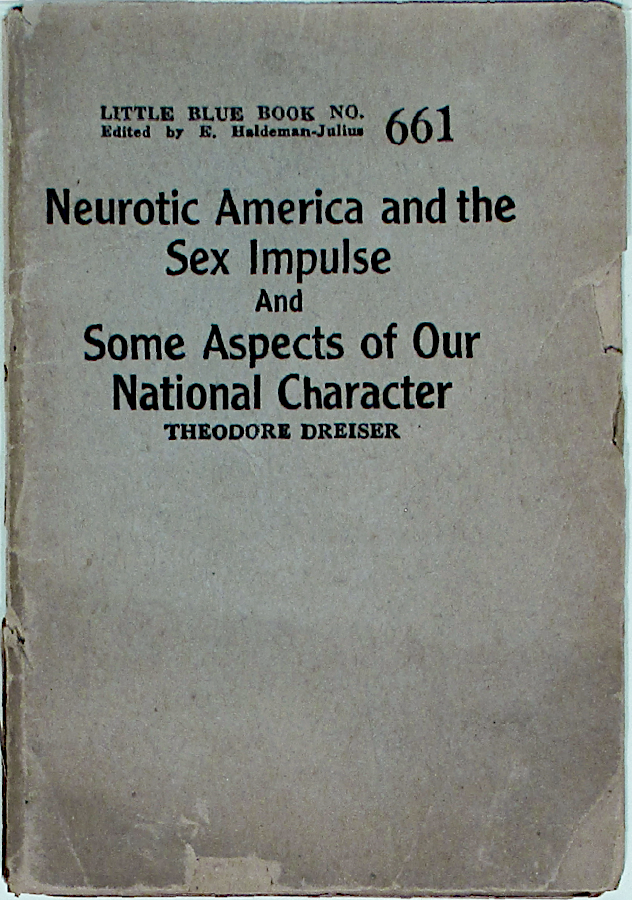
Credit: Theodore Dreiser, edited by E. Haldeman-Julius. 1920.Public.
Durant wrote a number of these Little Blue Books--small, focused tracts on different philosophers. In 1926 Simon and Shuster gathered these together and published them in a compendium entitled The Story of Philosophy. This compendium, which is almost a hundred years old, is for sale on Amazon, in paperback. The Blue Book version of The Story of Friedrich Nietzsche's philosophy can be viewed at select university libraries (ex: Archives at Rollins College.) I found the print version of the larger book on line.

Durant's indicates that with Zarathustra Nietzsche settled on a truth that served him for the rest of his life. Durant writes, "Zarathustra became for Nietzsche a Gospel whereon his later books were merely commentaries." (Location).
If Zarathustra is Nietzsche's gospel, then it is Zarathustra that will speak for him here. It is Zarathustra that he called his 'son'. Two places where he does that:
From philosophynow.org
Nietzsche soon confessed to her that he had conceived of a figure called Zarathustra partly as a substitute for the son he would never have.
Some days later, he told his friends the Overbecks of his aspiration to create “a filial figure artistically.” In a letter to Peter Gast written the following year, Nietzsche again calls himself “the father of Zarathustra.”
Thus, it is Zarathustra that is Nietzsche's ultimate legacy. Excerpts offered here are from Durant's book. The sections in quotation marks represents parts where he is quoting Nietzsche.
Friedrich Nietzsche (1861), Napoleon Bonaparte (1812)
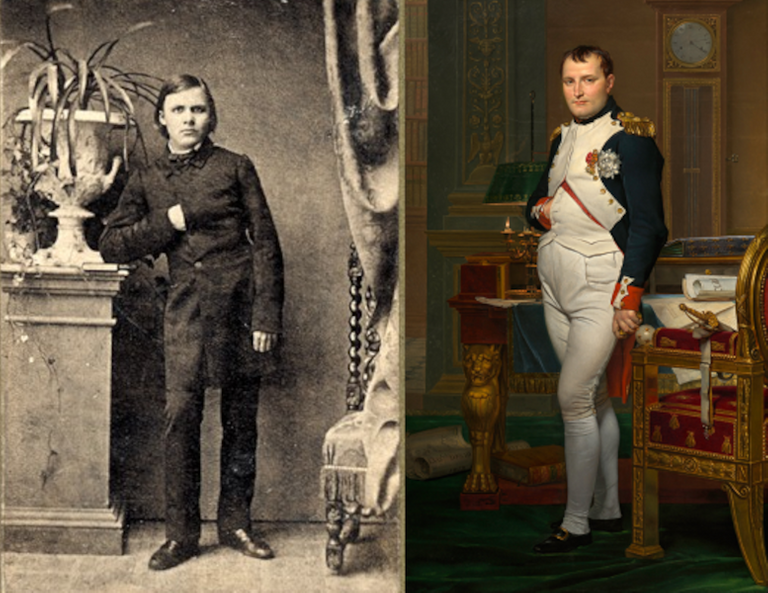
Nietzsche photo: author unknown. Napoleon painting: Jaques-Louis David. Both images are in the public domain.
While Nietzsche had disdain for most of humanity, he held Napoleon in high esteem. Napoleon was, in his view, the ideal man.
From Durant's book, explaining Nietzsche's view and quoting him:
the history of the influence of Napoleon is almost the history of the higher happiness to which the entire century has attained in its worthiest individuals and periods Location
“It is to Napoleon that the honor shall one day be given of having made for a time a world in which the man, the warrior, outweighed the tradesman and the Philistine.” Location
War is an admirable remedy for peoples that are growing weak and comfortable and contemptible; it excites instincts that rot away in peace. War and universal military service are the necessary antidotes to democratic effeminacy. “When the instincts of a society ultimately make it give up war and conquest, it is decadent; it is ripe for democracy and the rule of shop-keepers.”Location
“It is to Napoleon that the honor shall one day be given of having made for a time a world in which the man, the warrior, outweighed the tradesman and the Philistine.”Location
June 18, 1815 – Waterloo – Casualties at Hougoumont
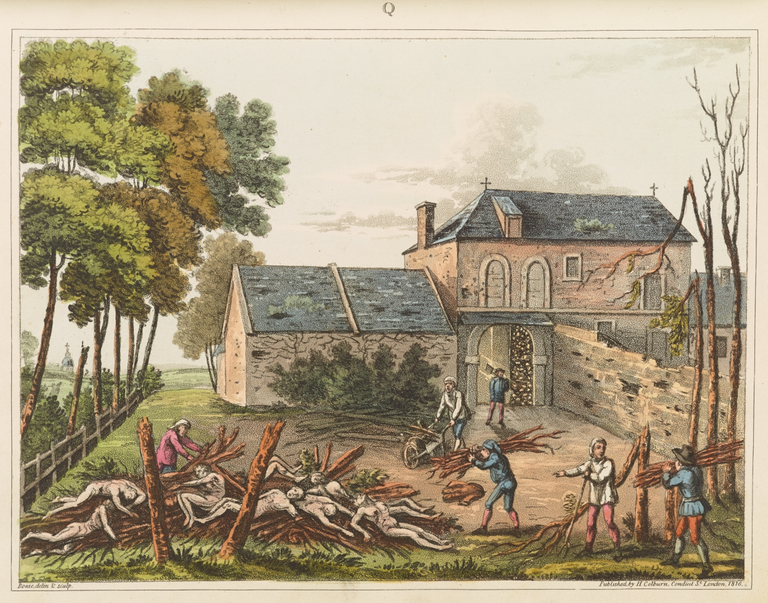
Credit: Cambridge Digital Library. Used under CC attribution share alike 3.0 unported license The number of people who died as a result of the Napoleonic Wars is not known. Estimates vary widely One analyst estimates 3,500,00. Another suggests the number may be 7,000,000. Nietzsche served briefly in the military. According to Durant, the young philosopher was conscripted and did not volunteer. "However, a fall from a horse so wrenched his breast-muscles that the recruiting-sergeant was forced to yield up his prey". According to Durant, that brief exposure to the military enabled Nietzsche to avoid the reality of war and to thereafter idealize it. Location
Democracy means drift; it means permission given to each
part of an organism to do just what it pleases; it means the
lapse of coherence and interdependence, the enthronement of
liberty and chaos. It means the worship of mediocrity, and
the hatred of excellence.Location
Worst of all are the English; it is they who corrupted the
French mind with the democratic delusion; “shop-keepers,
Christians, cows, women, Englishmen, and other democrats
belong together.”Location
Nietzche's father died when the philosopher was a boy. According to Durant, this left Nietzsche "a victim to the holy women of the household"--his mother and sister.
Nietzsche's Mother, Franziska Nietzsche
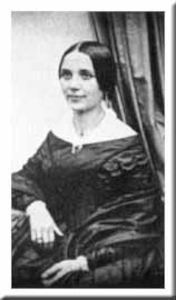
Credit: Author not given. 1850. Public domain
“Everything in woman is a riddle, and everything in
woman hath one answer : its name is child-bearing.” “Man is
for woman a means; the end is always the child. But what
is woman for man? ... A dangerous toy.” “Man shall be
educated for war, and woman for the recreation of the
warrior; everything else is folly".Location
Foiled in his search for love, he turned upon woman with a
bitterness unworthy of a philosopher, and unnatural in a man Location
"Woman has lost power and prestige by
her “emancipation” ; where have women now the position they
enjoyed under the Bourbons? Equality between man and
woman is impossible" Location
How much of Nietzsche's extreme (in my opinion) views in Zarathustra and latter writing might be attributable to his illness, an illness that ultimately claimed his life? Durant is clear on this:
Towards the end Nietz-sche’s work grew in bitterness; he attacked persons as well as ideas, — Wagner, Christ, etc. “Growth in wisdom,” he wrote, “may be exactly measured by decrease in bitterness ” : but he could not convince his pen.Location
Disease and increasing blindness were the physiological side of his breakdown. He began to give way to paranoic delusions of grandeur and persecution Location
Friedrich Nietzsche, in the Last Year of His Illness
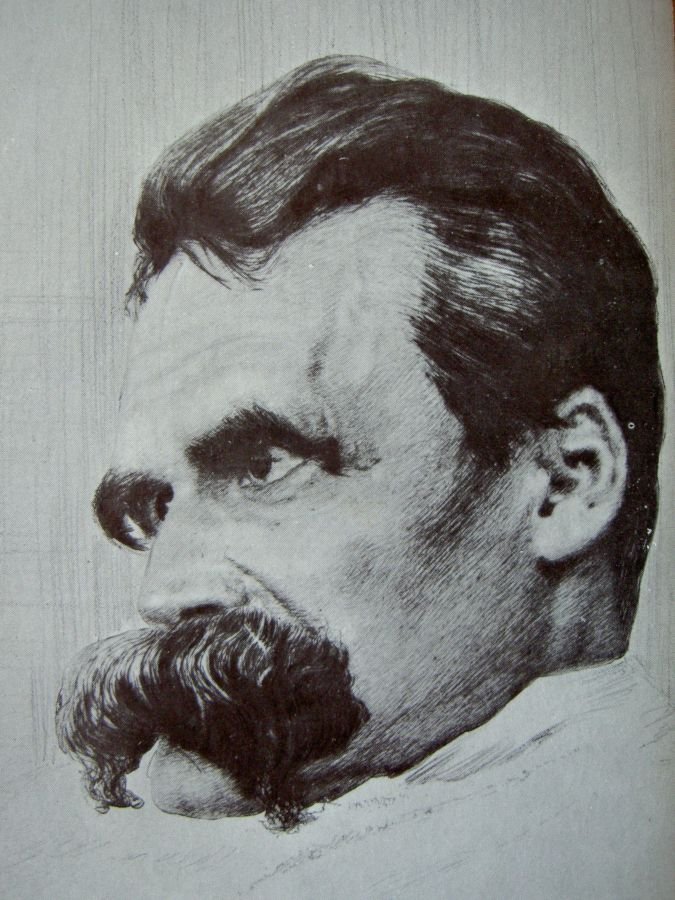
Credit: Hans Olde. 1899. Public Domain
Pictures of Nietzsche in his last years show great suffering. I feel for what he endured. His hard views are certainly more forgivable (to me) because when them wrote he may already have been suffering from mental illness. He was a brilliant, tortured and an inspired writer.
Nietzsche's apologists often ask us to look past his extreme statements and consider the power of his philosophy. But are we not to read a man's word and use it as his truth? Can we pick and choose the bits that please us and ignore the rest as though it doesn't exist? (View this, for example, where the narrator suggests we 'skip' an outrageously misogynist passage from Beyond Good and Evil?) I don't think that is a valid way to approach any subject.
I (obviously) find many of Nietzche's ideas toxic. It is not the man I find unpalatable. I find him pitiable, which is a posture he would detest.
Durant's Little Blue Book is very brief. I only read it after I heard the audio version. You may listen to the book (the narration is excellent) here. I cannot recommend too strongly this little book, audio or print version. Durant has a firm grasp not only on this subject, but on philosophy and culture.
(The print copy from which I derive quotes: archive.org/stream/thestoryphilosophy/willdurant.org)
archive.org/stream/thestoryphilosophy/willdurant.org
https://www.upi.com/Archives/1981/10/26/Historian-Ariel-Durant-who-collaborated-with-her-husband-Will/9538372920400/
https://www.britannica.com/topic/Thus-Spake-Zarathustra
https://www.britannica.com/biography/Friedrich-Nietzsche
https://en.wikipedia.org/wiki/S%C3%B8ren_Kierkegaard
https://en.wikipedia.org/wiki/William_James
https://en.wikipedia.org/wiki/Albert_Camud
https://aspace.rollins.edu/repositories/2/archival_objects/112515
https://www.jstor.org/stable/1408381
https://military-history.fandom.com/wiki/Napoleonic_Wars_casualties
https://www.britannica.com/biography/Friedrich-Nietzsche
https://lareviewofbooks.org/article/the-sufferings-of-nietzsche/
Hive on!
This is an interesting read, @agmoore. Thanks for sharing it. Friedrich Nietzsche is a foreign name to me until I read this piece. I made certain conclusions while reading and found them so towards the end of this post—Nietzsche's mental state and his philosophies being largely influenced by his childhood/home life. Though I'm not sure if the presence of his father or a father figure might have changed his conclusion on some of these topics.
I'm curious about Thus Spake Zarathustra though and why he's so attached to it (referring to the book as his son). If he would 'mature' his philosophy then it should be in this book.
I've always been interested in philosophy and see it as an adventure of the mind! I imagine if I get another chance to go to school, I'll give the subject an in-depth study but really, philosophy is all around us. I simply need to study people, their views on life, their values and beliefs. Hehe.
I enjoyed this review and will listen to Durant's audio on this. Thanks for the links. Well done! 🙂
Yes! They are just people, people who thought (think) a lot about things. As you can see from Nietzsche's story, they were flawed, as we are. I just learned yesterday that Rousseau had five children. All of them he placed in orphanages--he abandoned them!!! I used to think he was a great thinker. Now I don't regard him at all with respect.
You can be your own philosopher, although it does help to read other people's ideas (I like William James somewhat).
I have never studied philosophy in depth. Just a dilettante:)
Thanks for visiting, reading, and thoughtfully commenting. Have great week, @kemmyb
Very well written and thought provoking, as usual! Thanks for the links, I'll be sure to give a listen!
Thank you, @one-eye.; I appreciate your supportive feedback 🌼
I agree that it's a great introduction to Nietzsche's philosophy, and Durant does a good job of explaining Nietzsche's ideas in a clear and concise way.
I also agree that some of Nietzsche's ideas are quite extreme, and I can see why you find them toxic. However, I think it's important to remember that Nietzsche was a complex and contradictory figure, and his ideas should be interpreted in light of his entire body of work.
For example, Nietzsche's views on women are often cited as evidence of his misogyny, but it's important to remember that he also wrote extensively about the importance of love and compassion. In fact, some of his most famous passages are about the need for us to overcome our egotism and connect with others on a deeper level.
Ultimately, I think it's up to each individual to decide what they think of Nietzsche's ideas. There's no right or wrong answer, and it's important to be open-minded and willing to consider different perspectives.
I appreciate your thoughtful feedback. As I stated in my essay:
I spent years studying literature. I have read countless 'interpretations' of literary pieces. These interpretations are more about the critic than they are about the pieces. I turn to the text and let that speak. Interpretation is subjective.
If Nietzsche wanted to say something, if he wanted to value women and the feminine as highly as he valued men and the masculine, then he was perfectly capable of saying that. If he valued kindness, compassion and pity (yes pity--there is a place for pity) then he was perfectly capable of saying that. Please, find for me where he does. Find for me where he repudiates his harsh statements. Then I will place some weight on that.
Otherwise, his words speak for themselves--especially the words written in his later works, which would reflect a more mature, settled judgement
In this way you are telling that this book is very interesting and you have learned a lot from it and you have read this book many times. Try to get something special.
Hello @djbravo,
Yes, I did get a lot from it. A great deal of information packed in a few pages.
Thanks very much for visiting and commenting.
This is really interesting post
Thank you, @biyimi. I appreciate your comment.
Very interesting and touching kind of ,thanks for sharing
Thanks for stopping by and reading, @wallay. I appreciate your comment.